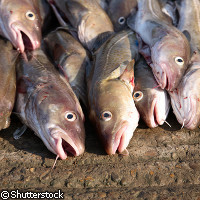Study finds 25% of fish on sale are mislabelled
A quarter of fish labelled as cod or haddock in shops and supermarkets in Dublin, Ireland, were found to be entirely different species of fish, new research has revealed. The findings are in line with similar tests conducted in the US, and raise concerns that imprecise tracking and labelling systems may be rife on a global scale. The results of the study are published in the journal Frontiers in Ecology and the Environment. The research was conducted by Irish ecologists who used DNA (deoxyribonucleic acid) barcoding to identify the species found in fish and chip takeaway shops, fresh fish shops and supermarkets in 10 suburbs across Ireland's capital city of Dublin. They tested smoked, fried, battered, fresh and frozen cod and haddock by extracting tissue from each sample and cross-referencing the gene sequences with several databases. They discovered that 39 out of 156 products on sale were not cod or haddock as their labels indicated but some other type of seafood. For smoked fish samples alone, a staggering 28 out of 34 (over 80%) were found to be inaccurately labelled. Around a quarter of the cod samples were incorrectly labelled as haddock (and vice versa) or a different type of fish altogether, such as pollack, whiting or saithe. In some cases, even Pacific cod was labelled as Atlantic cod. In the opening remarks to their study, PhD student Dana Miller and Dr Stefano Mariani from University College Dublin in Ireland explain that correct labelling of seafood provides consumers with information that allows them to make informed purchasing decisions. 'Yet, the renaming and mislabelling of seafood - as a consequence of ineffective regulations or poor policy implementation - remain serious problems,' they write. In a similar study conducted by a team from the University of California, San Diego in the US, scientists used the same approach to identify fish served in New York restaurants. They too discovered that 25% of the fish were mislabelled. In light of the comparable results from two different countries, Ms Miller suggested that mislabelling of seafood could be prevalent on a global scale. 'This, coupled with the enormous rise in seafood demand, raises alarm. There is an increasing need for effective and sustainable seafood industry management and especially for transparency within the seafood industry itself on an international level,' she said. According to Ms Miller, the results clearly indicate that officials have failed to implement and enforce strict EU regulations, and that the situation may hamper efforts to allow depleted stocks to recover. For instance, mislabelling cod in Ireland could be generating a false perception of market abundance. 'There are many problems associated with mislabelling fish, like in the case of mislabelling the depleted red snapper to enhance perceptions of availability in the US,' she added. 'Consumers may think that if 'cod' keeps showing up in markets and restaurants across Ireland, the stocks must be healthy.' Commenting on the rights of consumers, Dr Mariani said: 'Consumers should be able to go to a shop and know they are eating what they paid for, especially when the product is purchased within the EU, where numerous policies relating to labelling and tracing are already in place.' On a positive note, he added that the traceability of fish stocks will become more affordable and available in the future as a consequence of rapid progress in the field of bioinformatics. 'This will hopefully make enforcing the proper labelling of fish easier and will subsequently encourage transparency in the fishing industry,' concluded Dr Mariani. 'With a restored trust in retailers and policymakers, the seafood industry can be turned into a sustainable operation on a global scale.'
Countries
Ireland



